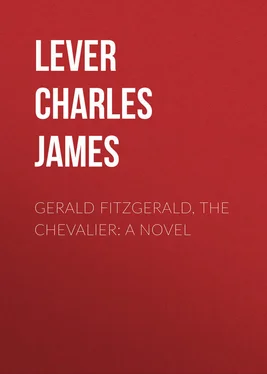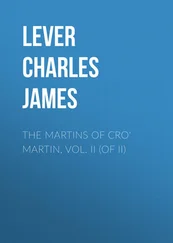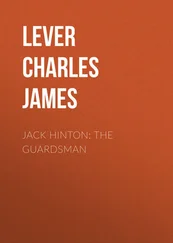Charles Lever - Gerald Fitzgerald, the Chevalier - A Novel
Здесь есть возможность читать онлайн «Charles Lever - Gerald Fitzgerald, the Chevalier - A Novel» — ознакомительный отрывок электронной книги совершенно бесплатно, а после прочтения отрывка купить полную версию. В некоторых случаях можно слушать аудио, скачать через торрент в формате fb2 и присутствует краткое содержание. Жанр: literature_19, foreign_antique, foreign_prose, на английском языке. Описание произведения, (предисловие) а так же отзывы посетителей доступны на портале библиотеки ЛибКат.
- Название:Gerald Fitzgerald, the Chevalier: A Novel
- Автор:
- Жанр:
- Год:неизвестен
- ISBN:нет данных
- Рейтинг книги:3 / 5. Голосов: 1
-
Избранное:Добавить в избранное
- Отзывы:
-
Ваша оценка:
- 60
- 1
- 2
- 3
- 4
- 5
Gerald Fitzgerald, the Chevalier: A Novel: краткое содержание, описание и аннотация
Предлагаем к чтению аннотацию, описание, краткое содержание или предисловие (зависит от того, что написал сам автор книги «Gerald Fitzgerald, the Chevalier: A Novel»). Если вы не нашли необходимую информацию о книге — напишите в комментариях, мы постараемся отыскать её.
Gerald Fitzgerald, the Chevalier: A Novel — читать онлайн ознакомительный отрывок
Ниже представлен текст книги, разбитый по страницам. Система сохранения места последней прочитанной страницы, позволяет с удобством читать онлайн бесплатно книгу «Gerald Fitzgerald, the Chevalier: A Novel», без необходимости каждый раз заново искать на чём Вы остановились. Поставьте закладку, и сможете в любой момент перейти на страницу, на которой закончили чтение.
Интервал:
Закладка:
‘Faith, if the portrait be not intended for myself, I am at a loss to guess,’ said Kelly good-humouredly.
‘So it is, you arch-scoundrel; and, shameless though you be, does it never occur to you how you will go down to posterity? The corrupter of a Prince; the fellow who debauched and degraded him!’
‘Isn’t it something that posterity will ever hear of me at all?’ said Kelly. ‘Is it not fame, at any rate? If there should be any records of our life together, who knows but a clever commentator will find out that but for me and my influence the Prince of Wales would have been a downright beast? – “that Kelly humanised your Royal Highness, kept you from all the contamination of cardinals and scheming Monsignori, rallied your low spirits, comforted your dark hours, and enjoyed your bright ones.”’
‘For what – for what? what was his price?’ cried Charles eagerly.
‘Because he felt in his heart that, sooner or later, you ‘d be back, King of England and Ireland, and George Kelly wouldn’t be forgotten. No, faith; Archbishop of Westminster; and devil a less I’d be – that’s the price, if you wish to hear it!’
The Prince laughed heartily, as he ever did when the friar gave way to his impertinent humour, and then, sitting up in his bed, told Kelly to order coffee. To his last hour, coffee seemed to exercise the most powerful effect on him, clearing his faculties after hours of debauch, and enabling him to apply himself to business when he appeared to be utterly exhausted. Kelly, who well knew how to adapt himself to each passing shade of temperament, followed the Prince into a small dressing-room in silence, and remained standing at a short distance behind his chair.
‘Tell Conway,’ said he, pointing to a mass of papers on the table, ‘that these must wait. I ‘ll go down to Albano tomorrow or next day for a change of air. I ‘ll not hear of anything till I return. Cardinal Altieri knows better than I do what Sir Horace Mann writes home to England. This court is in perfect understanding with St. James’s. As to the Countess, Kelly, let it not be spoken of again; you hear me? What paper is that in your hand?’
‘A petition, I believe, sire; at least, the quarter it comes from would so bespeak it.’
‘Throw it on the fire, then. Is it not enough to live thus, but that I must be reminded thirty, forty times a day of my poverty and incapacity? Am I to be flouted with my fallen fortune? On the fire with it, at once!’
‘Poor Luke’s prayers were offered at an untimely moment,’ said Kelly, untying the scroll, as if preparing to obey. ‘Maybe, after all, he is asking for a new rosary, or a pair of sandals. Shall I read it, sire?’
The Prince made no reply, and Kelly, who thoroughly understood his humour, made no further effort to obtain a hearing for his friend; but, tearing the long scroll in two, he muttered the first line that caught his eye:
‘"Petition of Mary Fitzgerald.”’
‘What – of – whom? Fitzgerald! what Fitzgerald?’ cried Charles, catching the other’s wrist with a sudden grasp.
‘"Sister of Grace Géraldine.”’
The words were not well uttered when Charles snatched the paper from Kelly’s hand, and drew near to the lamp.
‘Leave me; wait in the room without, Kelly!’ said he; and the tone of his voice implied a command not to be gainsaid. The Prince now flattened out the crumpled document before him, holding the fragments close together; but, although he bent over them attentively for several minutes, he made little progress in their contents, for drop by drop the hot tears rose to his eyes, and fell heavily on the paper. Gradually, too, his head declined, till at last it fell forward on the table, where he lay, sobbing deeply. It was a long time before he arose from this attitude; and then his furrowed cheeks and glazed eyes told of intense sorrow. ‘What ruin have I brought everywhere!’ was the exclamation that broke from him, in a voice tremulous with agony. ‘Kinloch said truly: “We must have sinned heavily, to be so heavily cursed!”’ Again and again did he bend over the paper, and, few as were the lines, it was long before he could read them through, such was the gush of emotion they excited. ‘Was there ever a cause so hallowed by misfortune?’ cried he, in an accent of anguish. ‘Oh! Grace, had you been spared to me, I might have been other than this. But, if it were to be – if it were indeed fated that I should become the thing I am, thank God you have not lived to see it! George,’ cried he suddenly, ‘who brought this paper?’
Kelly came at once at his call, and replied that the bearer was a poor friar, by name MacManus.
‘Let me see him alone,’ said the Prince; and the next moment Fra Luke entered the chamber, and, with a low and deferential gesture, stooped down to kiss his hand. ‘You are an Irishman.’ said Charles, speaking with a thick but rapid utterance; ‘from none of your countrymen have I met with anything but loyalty and affection. Tell me, then, frankly, what you know of this paper – who wrote it?’
‘I did, myself, your Royal Highness,’ said Luke, trembling all over with fear.
‘Its contents are all true – strictly true?’
‘As the words of this holy Book.’ said Luke, placing his hand on his breviary.
‘Why were they not made known to me before – answer me that?’ cried Charles angrily.
‘I’ll tell your Royal Highness why,’ replied Luke, who gained courage as he was put upon the defensive. ‘She that ‘s gone – the Heavens be her bed! – made her sister promise, in her last hour, never to ask nor look for favour or benefit from your Royal Highness.’
‘I will not believe this,’ broke in Charles indignantly; ‘you are more than bold, sir, to dare to tell me so.’
‘’Tis true as Gospel,’ replied the friar. ‘Her words were: “Let there be one that went down to the grave with the thought that loving him was its best reward! and leave me to think that I live in his memory as I used in his heart.”’
The Prince turned away, and drew his hand across his eyes.
‘How came she here – since when?’ asked he suddenly.
‘Four years back; we came together. I bore her company all the way from Ireland, and on foot too, just to put the child into the college here.’
‘And she has been in poverty all this while?’
‘Poverty! faith, you might call it distress! – keeping a little trattoria in the Viccolo d’Orso, taking sewing, washing – whatever she could; slaving and starving, just to get shoes and the like for the boy.’
‘How comes it, then, that she has yielded at last to write me this?’ said Charles, who, in proportion as his self-accusings grew more poignant, sought to turn reproach on any other quarter.
‘She didn’t, nor wouldn’t,’ said the Fra; ‘’twas I did it myself. I told her that she might ease her conscience, by never accepting anything; that I’d write the petition and go up with it, and that all I ‘d ask was a trifle for the child.’
‘She loves him, then,’ said Charles tenderly. The friar nodded his head slowly twice, and muttered, ‘God knows she does.’
‘And does he repay her affection?’
‘How can he? Sure he doesn’t know her; he never sees her. When we were on the way here, he always thought it was his nurse she was; and from that hour to this he never set eyes on her.’
‘What motive was there for all this?’
‘Just to save him the shame among the rest, that they couldn’t say his mother’s sister was in rags and wretchedness, without a meal to eat.’
‘She never sees him, then?’
‘Only when he walks out with the class, every Friday; they come down the hill from the Capitol, and then she’s there, watching to get a look at him.’
Читать дальшеИнтервал:
Закладка:
Похожие книги на «Gerald Fitzgerald, the Chevalier: A Novel»
Представляем Вашему вниманию похожие книги на «Gerald Fitzgerald, the Chevalier: A Novel» списком для выбора. Мы отобрали схожую по названию и смыслу литературу в надежде предоставить читателям больше вариантов отыскать новые, интересные, ещё непрочитанные произведения.
Обсуждение, отзывы о книге «Gerald Fitzgerald, the Chevalier: A Novel» и просто собственные мнения читателей. Оставьте ваши комментарии, напишите, что Вы думаете о произведении, его смысле или главных героях. Укажите что конкретно понравилось, а что нет, и почему Вы так считаете.












